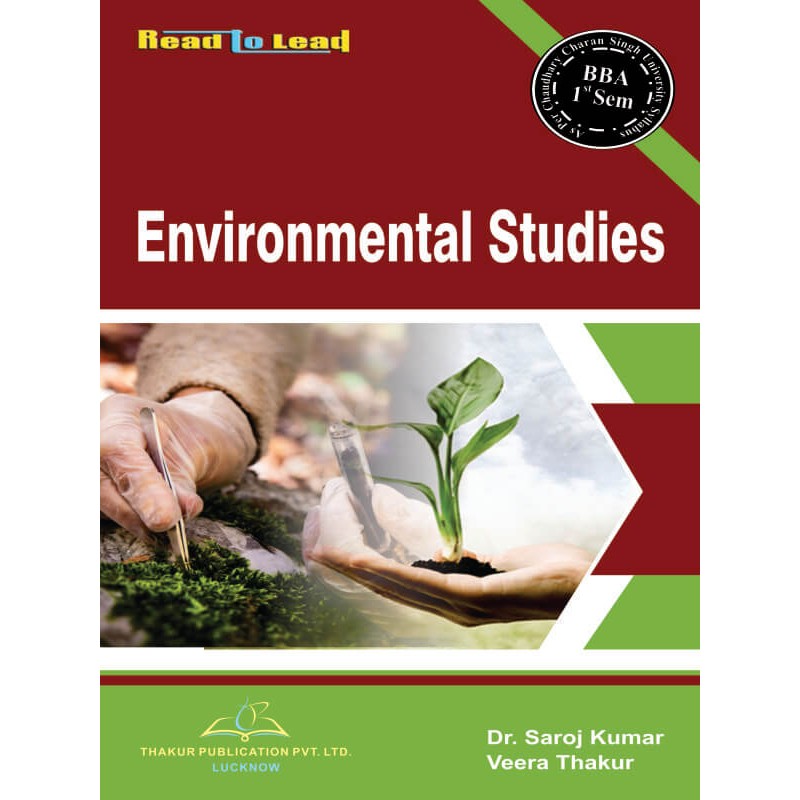




ISBN- 978-93-86232-06-9
AUTHORS- Dr. Saroj Kumar , Mrs. Veera Thakur
Syllabus
Environmental Studies
(Code-008)
Unit-1: The Multidisciplinary Nature of Environmental Studies: Definition, Scope and Importance, Need for Public Awareness.
Unit-2: Natural Resources
1) Renewable and Non-renewable Resources:
i) Forest Resources: Use and Over-Exploitation, Deforestation, Case Studies. Timber Extraction, Mining, Dams and their Effects on Forests and Tribal People.
ii) Water Resources: Use and Over-Utilisation of Surface and Ground Water, Floods, Drought, Conflicts over Water, Dams- Benefits and Problems.
iii) Mineral Resources: Use and Exploitation, Environmental Effects of Extracting and using Mineral Resources, Case Studies.
iv) Food Resources: World Food Problems, Changes caused by Agriculture and Overgrasing, Effects of Modern Agriculture, Fertiliser-Pesticide Problems, Water Logging, Salinity, Case Studies.
v) Energy Resources: Growing Energy Needs, Renewable and Non-renewable Energy Sources, Use of Alternate Energy Sources, Case Studies
vi) Land Resources: Land as a Resource; Land Degradation, Man Induced Landslides, Soil Erosion and Desertification.
2) Role of an Individual in Conservation of Natural Resources.
3) Equitable Use of Resources for Sustainable Lifestyles
Unit-3: Ecosystems
1) Concept of an Ecosystem
2) Structure and Function of an Ecosystem
3) Producers, Consumers and Decomposers
4) Energy Flow in the Ecosystem
5) Ecological Succession
6) Food Chains, Food Webs and Ecological Pyramids
7) Introduction, Types, Characteristic Features, Structure and Function of the following Ecosystem:
i) Forest Ecosystem
ii) Grassland Ecosystem
iii) Desert Ecosystem
iv) Aquatic Ecosystems (Ponds, Streams, Lakes, Rivers, Oceans, Estuaries)
Unit-4: Biodiversity and Its Conservation
1) Introduction – Definition: Genetic, Species and Ecosystem Diversity.
2) Bio Geographical Classification of India
3) Value of Biodiversity: Consumptive Use, Productive Use, Social, Ethical, and Aesthetic and Option Values.
4) Biodiversity at Global, National and Local Levels.
5) India as a Mega-Diversity Nation
6) Hot-Sports of Biodiversity.
7) Threats to Biodiversity: Habitat Loss, Poaching of Wildlife, Man-Wildlife Conflicts.
8) Endangered and Endemic Species of India
9) Conservation of Biodiversity: In-Situ and Ex-Situ Conservation of Biodiversity.
Unit-5: Environmental Pollution Definition:
1) Causes, Effects and Control Measures of:-
i) Air Pollution
ii) Water Pollution
iii) Soil Pollution
iv) Marine Pollution
v) Noise Pollution
vi) Thermal Pollution
vii) Nuclear Pollution
2) Solid waste Management: Causes, Effects and Control Measures of Urban and Industrial Wastes.
3) Role of an Individual in Prevention of Pollution
4) Pollution Case Studies
5) Disaster Management: Floods, Earthquake, Cyclone and Landslides.
Unit-6: Social Issues and the Environment
1) From Unsustainable to Sustainable Development
2) Urban Problems Related to Energy.
3) Water Conservation, Rain Water Harvesting, Watershed Management
4) Resettlement and Rehabilitation of People; its Problems and Concerns. Case Studies
5) Environmental Ethics: Issues and Possible Solutions.
6) Climate Change, Global Warming, Acid Rain, Ozone Layer Depletion, Nuclear Accidents and Holocaust. Case Studies.
7) Wasteland Reclamation.
8) Consumerism and Waste Products
9) Environment Protection Act.
10) Air (Prevention and Control of Pollution)Act
11) Water (Prevention and Control of Pollution)Act
12) Wildlife Protection Act
13) Forest Conservation Act
14) Issues Involved in Enforcement of Environmental Legislation
15) Public Awareness
Unit-7: Human Population and the Environment
1) Population Growth, Variation among Nations.
2) Population Explosion: Family Welfare Programme.
3) Environment and Human Health
4) Human Rights
5) Value Education
6) Women and Child Welfare
7) Role of Information Technology in Environment and Human Health
8) Case Studies